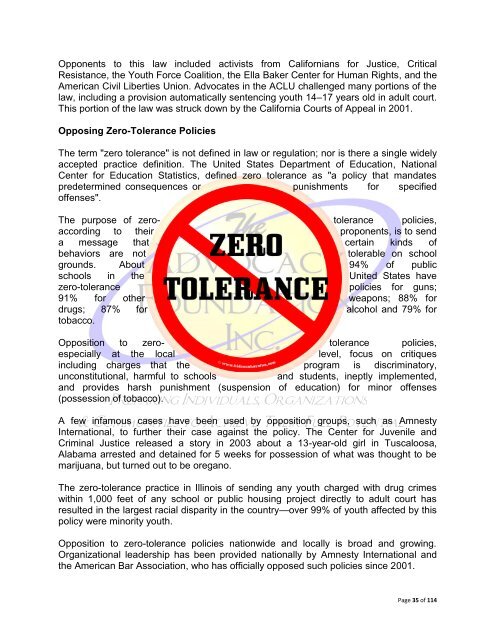African-American Youth in The Juvenile Justice System
African-American Youth in The Juvenile Justice System
African-American Youth in The Juvenile Justice System
You also want an ePaper? Increase the reach of your titles
YUMPU automatically turns print PDFs into web optimized ePapers that Google loves.
Opponents to this law <strong>in</strong>cluded activists from Californians for <strong>Justice</strong>, Critical<br />
Resistance, the <strong>Youth</strong> Force Coalition, the Ella Baker Center for Human Rights, and the<br />
<strong>American</strong> Civil Liberties Union. Advocates <strong>in</strong> the ACLU challenged many portions of the<br />
law, <strong>in</strong>clud<strong>in</strong>g a provision automatically sentenc<strong>in</strong>g youth 14–17 years old <strong>in</strong> adult court.<br />
This portion of the law was struck down by the California Courts of Appeal <strong>in</strong> 2001.<br />
Oppos<strong>in</strong>g Zero-Tolerance Policies<br />
<strong>The</strong> term "zero tolerance" is not def<strong>in</strong>ed <strong>in</strong> law or regulation; nor is there a s<strong>in</strong>gle widely<br />
accepted practice def<strong>in</strong>ition. <strong>The</strong> United States Department of Education, National<br />
Center for Education Statistics, def<strong>in</strong>ed zero tolerance as "a policy that mandates<br />
predeterm<strong>in</strong>ed consequences or punishments for specified<br />
offenses".<br />
<strong>The</strong> purpose of zero- tolerance policies,<br />
accord<strong>in</strong>g to their proponents, is to send<br />
a message that certa<strong>in</strong> k<strong>in</strong>ds of<br />
behaviors are not<br />
tolerable on school<br />
grounds. About 94% of public<br />
schools <strong>in</strong> the United States have<br />
zero-tolerance policies for guns;<br />
91% for other weapons; 88% for<br />
drugs; 87% for alcohol and 79% for<br />
tobacco.<br />
Opposition to zero- tolerance policies,<br />
especially at the local level, focus on critiques<br />
<strong>in</strong>clud<strong>in</strong>g charges that the program is discrim<strong>in</strong>atory,<br />
unconstitutional, harmful to schools<br />
and students, <strong>in</strong>eptly implemented,<br />
and provides harsh punishment (suspension of education) for m<strong>in</strong>or offenses<br />
(possession of tobacco).<br />
A few <strong>in</strong>famous cases have been used by opposition groups, such as Amnesty<br />
International, to further their case aga<strong>in</strong>st the policy. <strong>The</strong> Center for <strong>Juvenile</strong> and<br />
Crim<strong>in</strong>al <strong>Justice</strong> released a story <strong>in</strong> 2003 about a 13-year-old girl <strong>in</strong> Tuscaloosa,<br />
Alabama arrested and deta<strong>in</strong>ed for 5 weeks for possession of what was thought to be<br />
marijuana, but turned out to be oregano.<br />
<strong>The</strong> zero-tolerance practice <strong>in</strong> Ill<strong>in</strong>ois of send<strong>in</strong>g any youth charged with drug crimes<br />
with<strong>in</strong> 1,000 feet of any school or public hous<strong>in</strong>g project directly to adult court has<br />
resulted <strong>in</strong> the largest racial disparity <strong>in</strong> the country—over 99% of youth affected by this<br />
policy were m<strong>in</strong>ority youth.<br />
Opposition to zero-tolerance policies nationwide and locally is broad and grow<strong>in</strong>g.<br />
Organizational leadership has been provided nationally by Amnesty International and<br />
the <strong>American</strong> Bar Association, who has officially opposed such policies s<strong>in</strong>ce 2001.<br />
Page 35 of 114

















